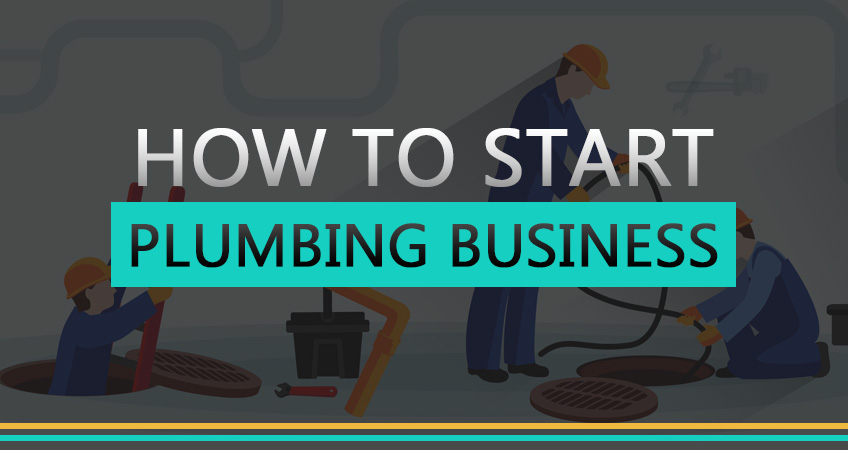How to Start a Plumbing Business?

Plumbing services are always in demand. From residential homes to commercial buildings, plumbing problems can occur at any time. The need for professional plumbing services remains constant, providing a steady stream of potential customers and a reliable market.
Starting a plumbing business offers opportunities for personal and professional growth. You can continue to learn and improve your skills, stay updated on industry advancements, and explore new technologies and techniques. As a business owner, you also have the chance to develop skills in areas such as leadership, management, marketing, and customer service.
10 Steps to Start a Plumbing Business
Starting a plumbing business involves careful planning and execution. Here are the general steps to follow:
1. Gain Plumbing Experience and Knowledge
Obtain the necessary plumbing skills and knowledge through apprenticeships, vocational training programs, or working as a plumber’s assistant. Acquire practical experience in various aspects of plumbing, including installation, repair, and maintenance.
- Consider enrolling in plumbing courses or vocational training programs. Many community colleges, technical schools, and trade organizations offer plumbing-specific programs that provide theoretical knowledge and hands-on training.
- Look for job openings as a plumber’s assistant or helper. This entry-level position allows you to work alongside experienced plumbers, observe their work, and gain practical experience.
- Take advantage of online resources to supplement your learning. Explore plumbing-related websites, blogs, forums, and instructional videos that provide detailed information on plumbing techniques, troubleshooting, and industry updates.
2. Develop a Business Plan
Create a comprehensive business plan that outlines your vision, target market, services offered, pricing structure, marketing strategies, financial projections, and operational details. This plan will serve as a roadmap for your plumbing business.

Start by conducting market research to understand your target audience and competition. Define your business objectives, services offered, pricing structure, and target market. Outline your marketing and sales strategies, create a financial plan, operational plan, etc. Lastly, regularly review and update your business plan to adapt to market changes.
3. Get Licensing Requirements Completed
Research the legal and licensing requirements for starting a plumbing business in your area. Obtain the necessary licenses, permits, and certifications to comply with local regulations. This may include becoming a licensed plumber or contractor and registering your business with the appropriate government agencies.
Licensing requirements for starting a plumbing business vary by location, but typically involve obtaining a plumbing license or contractor’s license. This may involve completing the required education or apprenticeship, passing an exam, and submitting an application to the appropriate licensing board or agency.
4. Set Up Your Business Structure
Decide on the legal structure of your plumbing business, such as sole proprietorship, partnership, or limited liability company (LLC). Consult with an attorney or accountant to determine the best structure for your specific situation.
The chosen structure determines factors such as legal liability, tax obligations, and ownership arrangement. Consulting with a professional can help determine the best structure for your plumbing business.
5. Secure Financing
Determine the startup costs for your plumbing business, including equipment, tools, vehicles, insurance, marketing expenses, and working capital. Explore funding options such as personal savings, small business loans, or grants to secure the necessary finances. Mainly consider the following 3 things –
- Personal savings can be used as initial capital, while loans from banks or financial institutions can provide additional funds.
- Small business grants may be available from government or private organizations.
- Investors can provide capital in exchange for a stake in the business.
6. Obtain Insurance Coverage
Protect your plumbing business by obtaining appropriate insurance coverage. This may include general liability insurance, workers’ compensation insurance, and professional liability insurance. Insurance provides financial security in case of accidents, damages, or lawsuits.
Insurance coverage is vital for a new plumbing business to protect against potential risks and liabilities. It’s important to consult with an insurance professional specializing in small businesses to assess your specific needs and ensure adequate coverage for your plumbing business.
7. Purchase Equipment and Tools
Starting a plumbing business requires essential tools and equipment to perform plumbing tasks effectively. Specialized equipment may include drain snakes, pipe inspection cameras, and leak detection devices. Additionally, a reliable vehicle for transportation and storage solutions for tools and supplies are crucial.
Other tools include wrenches, pipe cutters, soldering equipment, diagnostic tools, etc. Investing in quality tools and equipment ensures efficient and professional service delivery. Researching reputable suppliers and consulting with experienced plumbers can help determine the specific tools and equipment needed for your plumbing business.
8. Create a Marketing Strategy
Develop a marketing plan to promote and grow your plumbing business. Establish an online presence through a professional website and social media platforms. Utilize traditional marketing methods like print advertising, direct mailers, and networking within the community. Leverage online reviews and customer testimonials to build trust and credibility.
SEO for plumbing business can be the best marketing option as –
- It helps to improve the visibility and ranking of your website on search engine result pages.
- It enhances your online credibility and brand reputation.
- It generates organic traffic, more inquiries, and ultimately more customers.
9. Build a Customer Base
Attract customers by providing excellent service, maintaining professionalism, and delivering reliable plumbing solutions. Focus on building relationships and generating positive word-of-mouth referrals. Offer exceptional customer service to encourage repeat business and foster customer loyalty.
10. Monitor and Adapt
Continuously monitor the performance of your plumbing business, track financials, and analyze key metrics. Regularly review your business plan and marketing strategies to adapt to market trends, customer demands, and industry changes.
FAQ’s
Certainly! Here are some frequently asked questions (FAQs) for starting a plumbing business:
1. What qualifications or certifications do I need to start a plumbing business?
Requirements vary by location, but typically involve obtaining a plumbing license or contractor’s license. This may involve completing education or apprenticeship programs, passing exams, and submitting an application to the licensing board.
2. How much capital do I need to start a plumbing business?
Startup costs can vary depending on factors such as location, equipment needs, and marketing expenses. It’s advisable to create a detailed business plan to estimate your initial investment, including tools, vehicles, insurance, marketing, and licenses.
3. How can I attract customers to my plumbing business?
Implementing effective marketing strategies is crucial. This may include creating a professional website, utilizing search engine optimization (SEO), leveraging social media, networking with local businesses, and providing exceptional customer service to generate positive word-of-mouth referrals.
4. Should I specialize in a specific area of plumbing?
Specializing in a niche, such as residential or commercial plumbing, can help you establish expertise and target specific customer segments. However, offering a broad range of plumbing services can also attract a wider customer base and increase revenue opportunities.
5. How do I ensure compliance with plumbing codes and regulations?
Staying up to date with local plumbing codes and regulations is crucial. It’s advisable to join trade associations, participate in continuing education programs, and network with fellow plumbers to stay informed about any changes or updates.












